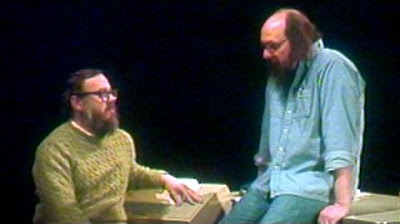Dennis Ritchie's video interview June 2011 by DennisRitchie.in
Summary
TLDRUNIX, an early operating system initiated in 1969, revolutionized computing by transitioning from mainframes to mini-computers, making them accessible to individual departments and universities. Developed by Ken Thompson, Dennis Ritchie, and others at Bell Labs, UNIX's kernel was pivotal in this shift. Today, its influence is evident in systems like Linux and macOS, with UNIX recently receiving a prestigious Japanese prize. Ritchie foresees the continued importance of small, embedded computers, including wearables, in the future of technology.
Takeaways
- 📚 UNIX was an early operating system that started in 1969 and paved the way for many tech innovations.
- 💡 The inspiration for UNIX came from Ken Thompson, who was interested in creating an operating system, with Dennis Ritchie joining soon after.
- 🛠️ UNIX was developed at Bell Labs by a team of young programmers aiming to make computing more accessible.
- 🏢 The era of UNIX's creation was dominated by mini-computers, which were cheaper than mainframes and marked the beginning of computing decentralization.
- 🌟 The kernel is a key component of UNIX, serving as the master control program, although it's not something most users would interact with directly.
- 🌐 UNIX and its derivatives are ubiquitous in today's digital landscape, even if the average user isn't aware of it by name.
- 📱 Many modern devices, including smartphones and e-readers like Kindle, run software that is derived from or compatible with UNIX.
- 🏆 UNIX was recently awarded a prestigious Japanese prize for its contributions to information and communications technology.
- 🤝 The development of UNIX was driven by a strong sense of community and collaboration among its creators.
- 🔮 Looking to the future, Dennis Ritchie sees the continued importance of smaller, embedded computers in unexpected places, such as wearable technology.
- 🌱 The humble beginnings of UNIX reflect the potential for innovation to emerge from a dedicated and synergistic group effort.
Q & A
What was the original purpose of UNIX?
-UNIX was initially created to take computers from the workplace to the home front, aiming to make computing more accessible.
Who were the key figures behind the creation of UNIX?
-Ken Thompson, Dennis Ritchie, and a handful of other young programmers at Bell Labs were the key figures behind UNIX.
What was the state of personal computing when UNIX was first developed?
-When UNIX started in 1969, personal computers did not exist as we know them today. It was the age of minicomputers, which were cheaper than mainframes but still quite expensive.
What is the kernel in the context of UNIX?
-The kernel is the key component of UNIX, serving as the master control program that manages the system's resources and processes.
Why is UNIX significant in the history of computing?
-UNIX is significant because it led the way for many tech pioneers and products, and its design principles influenced the development of modern operating systems.
What is the relationship between UNIX and modern operating systems?
-Many modern operating systems are derived from or compatible with UNIX, including versions of Linux and macOS, which is a variation on UNIX.
What award was UNIX recently given?
-UNIX was recently awarded the prestigious Japanese prize for information and communications.
What was the early development environment like for the UNIX creators?
-The UNIX creators worked in a close-knit group at Bell Labs, often working in the same room, which fostered a sense of community and synergy.
What does Dennis Ritchie envision for the future of computing?
-Dennis Ritchie envisions smaller computers becoming increasingly important, with wearable computers and embedded systems in unexpected places becoming more prevalent.
How has the concept of 'personal computing' evolved since the creation of UNIX?
-The concept of personal computing has evolved from the size of a refrigerator to the smartphones we carry today, with UNIX playing a foundational role in this evolution.
Why might the average user not be aware of UNIX by name?
-The average user might not be aware of UNIX by name because it operates behind the scenes in many systems derived from or compatible with it, making it a seamless part of our digital lives.
Outlines

This section is available to paid users only. Please upgrade to access this part.
Upgrade NowMindmap

This section is available to paid users only. Please upgrade to access this part.
Upgrade NowKeywords

This section is available to paid users only. Please upgrade to access this part.
Upgrade NowHighlights

This section is available to paid users only. Please upgrade to access this part.
Upgrade NowTranscripts

This section is available to paid users only. Please upgrade to access this part.
Upgrade NowBrowse More Related Video
5.0 / 5 (0 votes)





